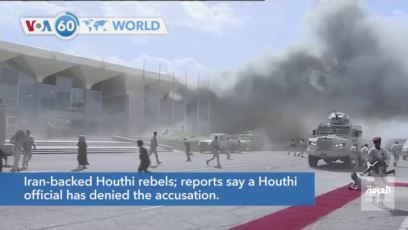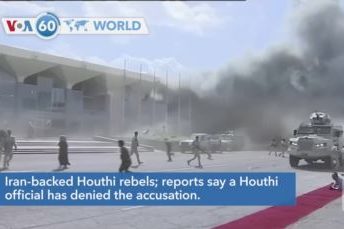BY TOM O’CONNOR

The premier of Yemen’s exiled yet internationally recognized government has claimed there is evidence that Iranian personnel were present at the site of a deadly airport attack that struck the southern city of Aden, an incident that Iranian officials have blamed on rival Saudi Arabia.
Yemeni Prime Minister Maeen Abdulmalik Saeed, who survived Wednesday’s attack at Aden International Airport as he and his newly sworn-in officials departed their plane, revealed preliminary results of a probe into the incident by the administration of exiled President Abed Rabbo Mansour.
In his remarks Thursday, Saeed blamed the bloodshed on Ansar Allah, the Zaidi Shiite Muslim group also known as the Houthi movement, which he accused of firing three guided missiles at the crowded airport site. He then alleged direct involvement by the rebel group’s foreign partner, Iran.
“There is intelligence and military information on the presence of Iranian experts who were present to undertake these acts,” a statement from the Yemeni Foreign Ministry read, which the premier confirmed.
“When we talk about the Houthi militia, this leads us to talk about Iran and its project of sabotage in the region by threatening international shipping and blackmailing the world through its arms and proxies from the militias in the region,” Saeed was quoted as saying.
The meeting was Saeed’s first since his violent return to Aden after a stay in the Saudi capital of Riyadh, which hosts Hadi’s Saud-backed government-in-exile. His new cabinet was sworn in at a ceremony in Riyadh on Monday, as part of a unity agreement to assuage tensions with the United Arab Emirates-backed separatist Southern Transitional Council.
In Tehran, Iranian Foreign Ministry spokesperson Saeed Khatibzadeh denounced the Aden attack. He blamed it on the Saudi-led coalition that launched a war nearly six years ago to oust the Houthi movement from the Yemen capital city of Sanaa.
“This kind of violence and killing of civilians is the result of the views of the aggressors and occupiers of Yemen, who, in the name of a self-made coalition, destroyed the whole of Yemen,” Khatibzadeh told reporters, “and continued the most catastrophic humanitarian crisis in Yemen with a militant and separatist view.”‘
He called for talks in place of fighting.
“By condemning the aggressors’ aggressive and belligerent actions and emphasizing a political solution,”Khatibizadeh said, “the Islamic Republic once again calls on all parties to end the futile conflict by returning to political dialogue.”
Khatibzadeh’s remarks were affirmed to Newsweek by an Iranian official in light of the recent accusations.
No group has yet claimed responsibility for the attack on Aden’s airport, but rival factions within the country and abroad have begun trading blame for the incident. Nearly two dozen people were killed, among them officials, international aid workers and journalists, with more than twice as many wounded.
Yemeni Information Minister Moammar al-Eryani announced on Wednesday that all cabinet members were “safe,” and called on countries and international organizations to condemn the “terrorist crime” and Ansar Allah itself.
His counterpart in the Ansar Allah-led administration, which is still in control of Sanaa, discounted the statements of the Saudi-backed government.
“The confused statements of the mercenary government of Riyadh about the explosions of Aden airport raise question marks,” Ansar Allah-led National Salvation Government Information Minister Zeifallah al-Shami tweeted, “and it is an attempt to cover up their crimes against civilians and settle the accounts of mercenary parties.
The Ansar Allah government’s Deputy Information Secretary Nasreddin Amer told Newsweek on Wednesday that residual infighting between Saudi-backed forces including the Hadi government and UAE-backed elements were to blame for the attack. They named the Southern Transitional Council as the most likely culprit.
“In fact, the conflict in Aden and in the various Yemeni governorates occupied by the coalition of aggression against Yemen has been raging for a long time, and it is not only a political conflict, but rather a military conflict and a large-scale war,” Amer said, “and the Riyadh Agreement came as an imposition from Saudi Arabia on the parties, especially those that follow the UAE.”
He argued that the UAE-supported side felt sidelined and sought to sabotage the Riyadh Agreement designed to ease tensions between the two sides that are supposed to be aligned in the fight against Ansar Allah.
“They have no desire for the implementation of this agreement and, as a result of their fear of Saudi pressure, they turned to using another method of conflict,” Amer told Newsweek. “This other method is what happened today in Aden, as the fire came out from under the ashes into the open, and the government they wanted to be a solution turned into a problem and a crisis.”
In a statement sent to Newsweek the following day, Southern Transitional Council Media Department Vice President Mansour Saleh shifted the blame back to Ansar Allah for a move he said was deliberately designed to disrupt unity efforts.
“The Houthis are the primary culprits in this crime and they are the ones who stand to benefit most from its results,” Saleh said. “This government is supposed to create a new climate and mechanisms to wage the battle against this group.”
He said others potentially implicated in the attack include officials from Yemen’s pre-Arab Spring government, directing suspicion toward those affiliated with the Muslim Brotherhood, though he said the true responsible party would be identified by an investigative committee that has been launched.
Still, Saleh noted that his council’s adversaries had an interest in attempting to sow discord.
“This is the first government in which the forces fighting the battle against the Houthis are participating and are serious about undertaking economic and military reforms,” he said, “unlike previous governments whose activities were characterized by corruption and impotence and were residing abroad and did not enjoy international recognition unlike the current government, and therefore they were targeted.”
And while he supported the recent unity efforts, for the time being, he still regarded the Hadi administration’s control over southern Yemen as “an occupation” arguing that “the world must respect the will of the people of the South and enable them to restore their state by peaceful means.”
Some Ansar Allah officials such as Abdulelah Hajar, a veteran Yemeni diplomat who serves now as adviser to the presidency of the Ansar Allah-led Supreme Political Council, felt Saudi Arabia itself was more to blame, though the rift between Saudi- and UAE-sponsored factions remained a frequently cited motive.
“It does not require intelligence or analysis to know that whoever undertook the criminal terrorist act by bombing Aden airport is the same one who undertook the aggression against Yemen six years ago and killed and wounded hundreds of thousands of innocent Yemenis by airstrikes and imposed siege by land, air and sea,” Hajar wrote Tuesday on Facebook.
Yemen’s civil war is rooted in unrest that brewed during the region-wide Arab Spring movement that saw popular protests oust then-President Ali Abdullah Saleh, who first led North Yemen in 1978 and oversaw the unification of the country in 1990 before stepping down in 2012.
Hadi, his deputy, assumed power, but faced a myriad of crises, including mass demonstrations, an insurrection by Ansar Allah, and advances by Sunni Muslim militant groups Al-Qaeda and the Islamic State (ISIS).
Ansar Allah took the capital in late 2014 and seized the presidential palace early the following year, forcing Hadi to flee to Aden. A Saudi-led coalition of Arab states first launched its war in March 2015, leaving the nation in a relative stalemate in which continued clashes have defied attempts for peace and contributed to what the United Nations has described as the world’s worst humanitarian crisis.
Further complicating the conflict, a fallout between government forces and those of the Southern Transitional Council led Hadi to once again flee, this time from Aden to Riyadh, where he was hosted for some time in a hotel before being moved to an apartment.
Though Saudi Arabia has attempted to ease tensions between the two sides, bitterness is believed to remain. The Yemen Solidarity Council, an Ansar Allah-recognized overseas observatory, warned of more potential strife to come in the wake of the airport attack it joined other parties in denouncing.
“We condemn the attack and pray for the civilian victims & relatives of the blast,” the council said in a statement Wednesday sent to Newsweek. “However, the attack indicates in some ways that the Hadi hotel regime isn’t welcome in Yemen at all, and that the new Riyadh-agreement government still suffers from bloody & continuous infighting for the detriment of the common Yemeni civilian.”
The United States also spoke out against the Aden attack on Wednesday.
In a statement, State Department spokesperson Cale Brown said Washington “strongly condemns” the incident and offered condolences to the victims. He did not identify any suspects, but said the circumstances surrounding the attack “once again demonstrate the malicious intent of those trying to destabilize Yemen.”
“Such attacks will not stop or undermine efforts to bring a lasting peace that the Yemeni people deserve,” Brown said. “These violent acts must end, and the perpetrators must be brought to justice. The United States supports the legitimate government of Yemen and stands with the people of Yemen as they work towards a better future for all Yemenis.”
Throughout Yemen’s conflict, the U.S. has offered direct support to the Saudi-led coalition against Ansar Allah, which Washington considers directly tied to Tehran despite denials from both parties.
This assistance has expanded under President Donald Trump, who has vetoed congressional attempts to halt such aid over human rights concerns over reports of civilian casualties and the transfer of weapons to militant groups.
On Thursday, the State Department approved another arms sale worth $290 million to provide the kingdom with 3,000 GBU-39 Small Diameter Bomb I (SDB I) Munitions and related equipment.
“This proposed sale will support U.S. foreign policy and national security objectives by helping to improve the security of a friendly country that continues to be an important force for political stability and economic growth in the Middle East,” the Pentagon’s Defense Security Cooperation Agency said in a statement at the time.


Leave a Reply
You must be logged in to post a comment.